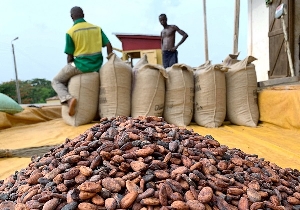President Nana Akufo-Addo called regulators of the cocoa sector in Ghana and neighbouring Ivory Coast to “devise new strategies” to cope with volatile global prices.
Cocoa prices have seen a major rally this year to all-time highs on supply concerns. Due to limited supplies, global cocoa grinders are paying up in the cash market to secure cocoa supplies this year, with concerns that West African cocoa suppliers may default on supply contracts, according to Barchart.
Speaking at the inauguration of the permanent headquarters for the Côte d’Ivoire-Ghana Cocoa Initiative (CIGCI) in Accra, President Akufo-Addo said the current peak in cocoa futures “necessitates a revision of the initial approach to sustain or prevent a decline in prices”.
“This underscores the importance of this organisation for the two countries to devise new strategies to address the evolving market dynamics,” the President stated.
The two West African nations, which produce about 65 percent of the world’s cocoa beans, established the CIGCI in 2019 to exert more control over pricing and supply chains long dominated by international traders and processors.
A key early move was the introduction of a Living Income Differential (LID) premium of US$400 per metric tonne paid to local farmers on top of the market price starting in the 2020/2021 crop season. “What was thought of as impossible only two years ago is happening now,” Akufo-Addo said of the LID, which guarantees higher incomes for impoverished cocoa growers.
However, he warned that with cocoa futures trading at record highs, revisions may be needed “to sustain or prevent a decline in prices”. Cocoa prices skyrocketed again last week Thursday amid signs of resilient global demand and growing fears of potential delivery defaults by West African suppliers facing a supply crunch.
Bloomberg reported the Ghana Cocoa Board is negotiating to postpone the shipment of 150,000 to 250,000 metric tonnes until next season due to a lack of beans. The supply shortage is driven by a production slump in the top grower Ivory Coast, where the 2023/2024 harvest is projected to be 21.5 percent lower than the previous year, reaching an eight-year low of just 1.75 million tonnes.
Cocoa prices have rallied sharply since the beginning of the year, driven by the worst supply shortfall in 40 years. Lower production in the Ivory Coast remains a major bullish factor for prices.
The cocoa initiative between Ghana and Ivory Coast grew out of the two leaders’ “strategic partnership” launched in 2017 to boost sustainability and efficiency across the industry.
In his speech, President Akufo-Addo recalled signing that initial deal with his Ivorian counterpart “when I came into office” and hailed the CIGCI headquarters as representing the countries’ “shared aspiration for a prosperous cocoa economy”.
The President said the new building symbolises “what regional unity and cooperation can achieve” and represents “the beginning of a new chapter in the history of the African cocoa industry”.
He expressed confidence the joint body will “pioneer the way forward” by addressing pricing instability, farmer incomes and supply chain control.
President Akufo-Addo highlighted the need for the CIGCI to establish “unified positions”, especially regarding new European Union regulations governing sustainability and supplies of cocoa entering the crucial export market. “Collaborative efforts between Ghana and Côte d’Ivoire are essential to safeguard the interests of our farmers,” he stated, adding that “it is imperative for this collaboration to proactively address these challenges, reinforcing the need for cohesive action.”
Ghana, in particular, is seeing the economic impacts of its cocoa policy reforms, the President said.
Its installed processing capacity has risen above 50 percent of national output, while the total value of exported secondary products now averages above US$800million per year. “We will continue to work with the government of Côte d’Ivoire, united in our quest for sustainable and prosperous cocoa sectors in our two countries,” Mr. Akufo-Addo concluded.
Business News of Monday, 22 April 2024
Source: thebftonline.com













